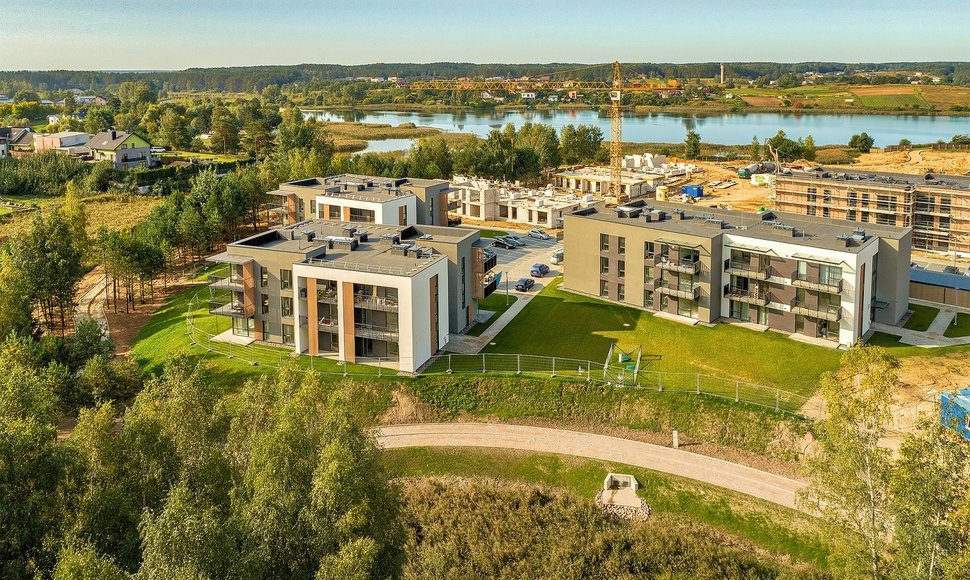Jurgita Kveselaitė, executive director for the real estate developer HOMA, observes that the first quarter of 2020 was one of the best in history for real estate developers. However, the lockdown shifted trends in the other direction. During the second quarter, sales fell by around fourfold compared to both the first quarter of the year and when looking year on year. With the end of the lockdown, in quarter three the real estate developers’ sales once again returned to previous levels, with almost 1,300 apartments sold during this period.
According to data from HOMA, 5,520 apartments were sold in the capital last year. Whereas during the first ten months of 2020, sales of 3,780 apartments were agreed upon which is approximately a 20 per cent reduction year on year.
“If it so happens that developers have to halt processes and that we conclude this year with 4,000 apartments sold, this year will be around 28 per cent worse than 2019, but a few percentage points better than 2018,” J. Kveselaitė notes.
Active purchasing in all segments
Traditionally, the economy class has been the most sensitive to market shocks. According to J. Kveselaitė, this is the segment that begins to slow down and see reduced sales first. It is also the first to recover after shocks.
“However, this autumn all the segments displayed near-identical recovery. This means that there is no single dominant group of customers which boosted the new apartment market. Quick recovery is the result of diversity in demand, and sales numbers for October were among the best seen this year, with 630 apartments sold/sales agreements signed. These numbers suggest that the risk of the second lockdown has not done much to intimidate new home buyers,” J. Kveselaitė says.
Based on HOMA data, in late October this year there were 4,400 unsold apartments in the capital, available through nearly 120 different projects. J. Kveselaitė points out that while the combined number of vacant apartments is large, around a third of these projects only have a handful of unsold apartments. Another third is the projects with the number of unsold apartments ranging between ten and 40. “It could be said that there aren’t many major or significant projects in the market at the moment. A ‘stockpile’ of unsold apartments in Vilnius has settled at around 4,500, with fluctuations of a few hundred in either direction. This suggests that we will continue to see similar figures to the end of this year,” says the expert.
Economy class buyers most active
According to Kveselaitė, the greatest competition is currently being observed in the economy class segment, which is the largest in terms of both supply and sales volume. One of the more notable aspects of this segment is that a sizeable part of the demand comes from first-time buyers. These are usually younger individuals or young families. Often these clients are faced with two options – to rent or to invest in their own home.
“As long as Vilnius continues its population growth trends, the need for first homes will not decrease. Whether these residents will be inclined to buy a home during the second lockdown or afterwards will greatly depend on bank policies and financing conditions. At the moment, they are difficult to predict, but the first lockdown has shown no radical changes as far as the banks are concerned,” J. Kveselaitė explains.
Won’t be showered with gifts
The expert observes that with sales slowing down, real estate developers often make use of various marketing strategies to encourage people to invest in a home of their own. “The recent months have been especially favourable to real estate developers and it appears that the mood among them is quite positive at the moment. So it is unlikely that we will see many customer-attracting promotions in the near future. Nevertheless, the possibility cannot be dismissed that if sales numbers fall, there could be an increase in various extras and discounts on offer. Usually, this encourages certain buyers to make their choice,” J. Kveselaitė says.
The expert also notes that the period of significant changes can also create new opportunities for businesses. “With the market predominantly demand-driven, many developers choose the easiest route: build, sell and earn, focusing far less on the exclusivity, innovation, appeal and added value of the homes being constructed. Therefore, the crisis could potentially become an excellent stimulus to step up in terms of quality. We are also seeing that some property developers are putting their plans on hold, which offers opportunities for new players to enter the market. It can also help the existing firms to solidify their foundations,” J. Kveselaitė says.
About HOMA
A well-known name in the real estate development since 2007, the company has combined all its projects, experience and philosophy under the brand HOMA. Eight apartment and private house projects, now being occupied by more than 800 new residents and their families, have so far been developed by HOMA across the residential and central areas of Vilnius. HOMA is among the top five largest residential real estate developers in Vilnius and holds a 15.4 per cent share of the economy class homes market in the capital. The developer’s largest projects are Lazdynėlių Vingis - a residential estate near the bend of river Neris, characterised by the slate-tile facades; Gilužio Rivjera - a set of low-rise apartment blocks on the banks of a lake; Paukščių Takas – a residential development offering apartments overlooking the Karoliniškės preserve, and others. Currently HOMA is selling properties which are part of the six projects still under development in Vilnius: Lazdynėlių Vingis, Gilužio Rivjera, Paukščių Takas in Šeškinė, Laisvės 77 in Pašilaičiai, Vytenio 4 and Bendorėlių Slėnis.












